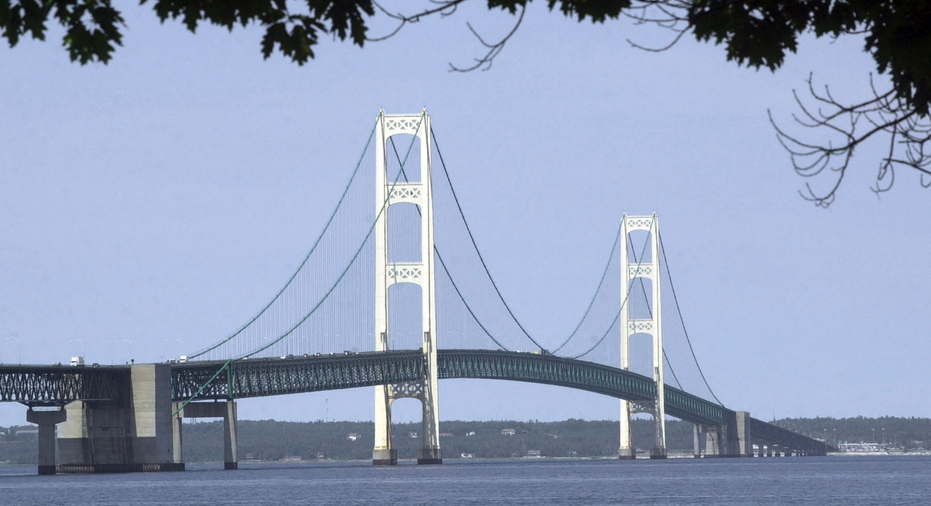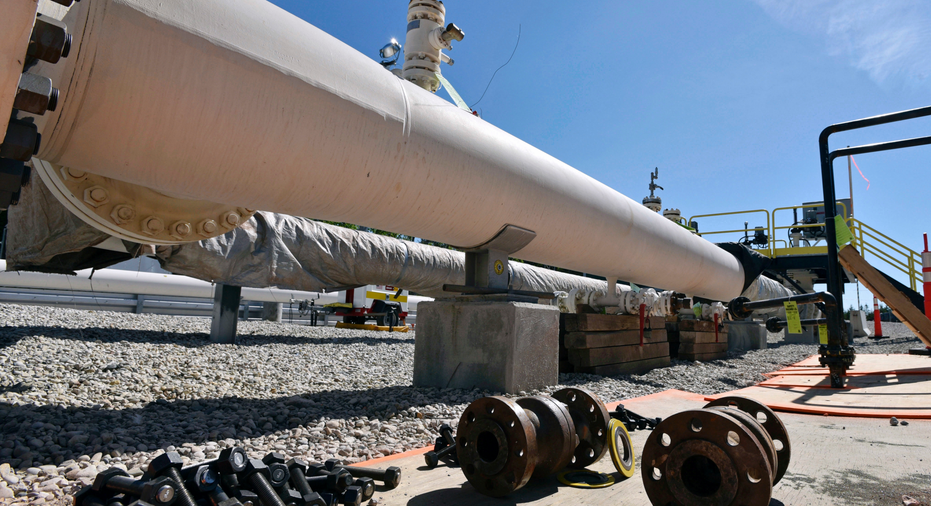Judge orders closer look at Great Lakes oil spill plans
FILE - In this July 19, 2002 file photo, the Mackinac Bridge that spans the Straits of Mackinac is shown from Mackinaw City, Mich. A federal judge has ordered The Pipeline and Hazardous Materials Safety Administration to take a closer look at pipeline company Enbridge’s plans for dealing with a potential oil spill in the waterway connecting Lakes Huron and Michigan. In a ruling Friday, March 29, 2019, U.S. District Judge Mark Goldsmith instructed the agency to provide more information about its reasons for approving the plans. (Dale G Young/Detroit News via AP, File) (AP Photo/Carlos Osorio, File)
TRAVERSE CITY, Mich. – A federal judge has ordered a government agency to take a closer look at pipeline company Enbridge's plans for dealing with potential oil spills in the waterway connecting Lakes Huron and Michigan.
U.S. District Judge Mark Goldsmith instructed the Pipeline and Hazardous Materials Safety Administration to provide more information about its reasons for approving the Canadian company's spill response strategies for areas including its Line 5, which carries oil and natural gas liquids between Superior, Wisconsin, and Sarnia, Ontario.
Goldsmith's ruling Friday was in response to a lawsuit by the National Wildlife Federation. The group contended the plans omitted key details about personnel, equipment and methods that would be used to contain and clean up oil that could be released from a rupture of a 4-mile-long (6.4-kilometer long) underwater segment of the pipeline that extends through the Straits of Mackinac.
PHMSA responded that Enbridge had satisfied the requirements by contracting with oil spill removal organizations that the U.S. Coast Guard recognized as having necessary resources.
Goldsmith acknowledged Enbridge had an extensively detailed "master service agreement" with the contractors. But the Detroit-based judge said PHMSA still "did not articulate a satisfactory explanation for its decision to approve the response plans."
The wildlife federation also said the pipeline agency was legally required to prepare an environmental analysis and consider potential effects on endangered species but had failed to do so. Goldsmith ordered PHMSA to do both.
"This ruling confirms what we've known for years — Enbridge is not prepared for an oil spill, and the federal government is not doing enough to protect the Great Lakes," Beth Wallace of the wildlife federation said Monday.
The pipeline agency was reviewing the decision and had no immediate comment, spokesman Bobby Fraser said.
"We have thoroughly reviewed the response plan in place for the straits on the off-chance that anything were to happen, although we've never had an incident in the straits in 65 years," Enbridge spokesman Ryan Duffy said.
PHMSA endorsed Enbridge's spill contingency plans for the pipeline network that includes Line 5 in 2015 and 2017. The latter plan covers the underwater section, which is divided into two pipes 20 inches (50.8 centimeters) in diameter.
University studies have projected that a worst-case release of oil in the swirling straits could foul hundreds of miles of shoreline.
Enbridge has said repeatedly the submerged pipes are in good condition and could last indefinitely. But the company, based in Calgary, Alberta, reached an agreement last year with former Michigan Gov. Rick Snyder to decommission that section of Line 5 in favor of a new pipe that would be routed through a tunnel drilled in bedrock beneath the straits.
However, Michigan's recently elected attorney general, Dana Nessel, ruled last week that a law enacted in December to carry out the agreement violates the state constitution. Snyder's successor, Democratic Gov. Gretchen Whitmer, then ordered state agencies not to issue permits or take other steps toward implementing the deal.
Enbridge says it plans to discuss its next steps with Whitmer administration officials.
___
Follow John Flesher on Twitter at http://www.twitter.com/johnflesher





















